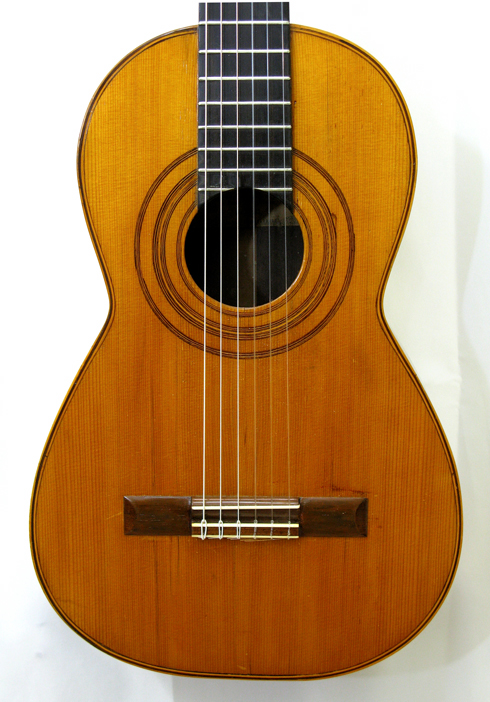1853 Francisco Casasnovas
1853 Francisco Casasnovas
Make: Francisco Casasnovas
Model: Guitar
Model Year: 1853
Top: German Spruce
Back & Sides: Brazilian Rosewood
Scale: 650mm
Nut: 50mm
Finish: French Polish
Tuners: Pegs
Country: Spain
Condition: Used - Excellent
Location: Tucson
Francisco Casasnovas (the surname is also written Casanovas) was born in 1816 in Palma de Mallocora. He began building guitars and bandurrias in 1845, opening his workshop at Plaza de la Merced 1, Palma de Mallorca. He trained his sons, Bartolome Casasnovas i Fiol, and Miguel Casasnovas de Fiol. When he died in 1876, his sons took over the workshop, building under the label Hijos de Casasnovas until 1927. This guitar is historically important in that it shows that the seven brace kite system with closing chevrons was already in use before Torres. The guitar is made with fine German spruce, and Brazilian rosewood. The scale length is 650mm, with a 50mm nut. The guitars of Casasnovas, like those made by Agustin Caro (who was active in Granada from about 1800 to 1830) have deeper sides than a modern classical, ranging from 98mm at the neck to 108mm at the bottom. This helps compensate for the guitars smaller body, by giving the box a greater air mass, to produce a deeper tonality. Among the other interesting features of this guitar are reinforcing bracing on either side of the fingerboard, locked into the traverse brace, a system which has successfully prevented a common problem of cracks forming along either side of the fingerboard as the ebony shrinks since 1853. The neck and headstock are made of a single piece. The top, back, and sides are very thin, and the guitar is very light. While this guitar has had its share of repairs over the years, it remains a wonderful, responsive, concert quality instrument that puts a lie to the myth of guitars having short life spans.




